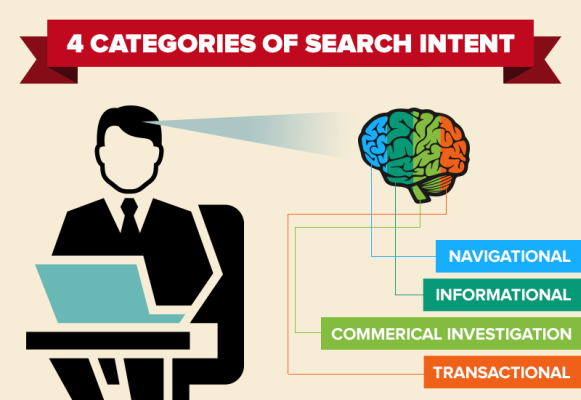4 types of search intent
There are a few distinct types of search intent, these four are most commonly used:

Navigational intent
The first type of search intent is called navigational intent. People with this intent want to visit a specific website. For example, people who search for [Facebook] are usually on their way to the Facebook website.
Keep in mind that ranking high for a navigational term is only beneficial for your organic traffic if your site is the site people are looking for. These searchers are looking to navigate to a specific website, and it’s often easier to run a quick search in Google than to type out the URL. The user could also be unsure of the exact URL or looking for a specific page, e.g. a login page. As such, these searches tend to be brand or website names and can include additional specifications to help users find an exact page.
Informational intent
Second, there is informational intent. Lots of searches on the internet are done by people looking for information. That could be information about the weather, information about educating children, information about SEO, you name it. People with informational intent have a specific question or want to know more about a certain topic. This could be in the form of a how-to guide, a recipe, or a definition. It’s one of the most common search intents, as users can look for answers to an infinite number of questions. That said, not all informational terms are questions. Users searching for simply “Bill Gates” are most likely looking for information about Bill Gates.
You should be aware that Google’s understanding of intent goes much further than simply showing results that give information about a specific term. It knows, for instance, that people looking for [tomato sauce] are looking for recipes, not for the sauce’s culinary history. It understands that most people typing in [Mercury] are looking for the planet, not the element. Google even understands that for some terms, like [how to build a bird feeder], it’s handy to include videos and images.
Commercial Investigation
Before they’re ready to make a purchase, users start their commercial investigation. This is when they use search to investigate products, brands, or services further. They’re past the informational stage of their research and have narrowed their focus to a few different options. Users here are often comparing products and brands to find the best solution for them.
Note: These searches often include non-branded localized terms such as “best body shop near me” or “top sushi restaurant NYC.”
Transactional
Transactional searchers are looking to make a purchase. This could be a product, service, or subscription. Either way, they have a good idea of what they’re looking for. Since the user is already in buying mode, these terms are usually branded. Users are no longer researching the product, they’re looking for a place to purchase it.
Course tip: Search Intent for better SEO (#1 SEO Ranking Factor)
For a better SEO, it is important that we should be publish content keeping in mind the latest updates by Google. Google has designed its algorithms in the manner that, it is now able to understand the intention behind any query. Therefore, it tries to bring those results on the First page of Google, which have highest potential to satisfy the user intent. For SEO Practitioners, it becomes important to publish the content satisfying the Search intent of the user. This not only assist us in winning the confidence of algorithms like Rank brain, but also it will help in improving the conversion rate and organic visibility.
What is included in this course?
The course will help you in understanding various aspects related to Search intent. Introduction You will see meaning, basics and types of Search Intent. These will help you in understanding the basic aspect of Search Intent. Sales Funnel Users on Google behave in a certain pattern. They follow a journey through which they make their mind to shop anything or take actions. This is called buyer journey. Understanding buyer journey is really very important if we want to produce content that can satisfy the Search Intent. This not only help in improving the Conversion Rate but it also help us in increasing the Organic visibility and other brings other SEO benefits like topical optimization and Semantic SEO.
Search intent and Sales funnel have a deep relation with each other. Understanding various kind of Search Intent It is important to understand the different types of search intent, if we want to publish Relevant Content on our website. This course contains various types of Search intent and also how can we work on these to make improve our Semantic SEO score and to bring the effect of topical optimization, which has become very important SEO strategy especially after hummingbird and Rankbrain. Content Strategy It is important to publish the content strategically. So you will learn the basic 3C strategy that is essential to publish relevant content.
Search Intent for better SEO (#1 SEO Ranking Factor)

